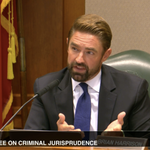Entries by Death Penalty Information Center
News
Oct 29, 2024
Hearings Begin on Constitutional Challenge to Kansas’ Death Penalty and Capital Jury Selection Process
On October 28, 2024, hearings began in Kansas’ Wyandotte County District Court regarding the constitutionality of the state’s death penalty and its capital jury selection process. A coalition of the ACLU Capital Punishment Project, the ACLU of Kansas, the Kansas Death Penalty Unit, and the law firms Hogan Lovells and Ali & Lockwood brought the challenge. The team argues that the death penalty, which is rarely used in Kansas, is “arbitrary, racially discriminatory, unreliable, and…
Read MoreNews
Oct 28, 2024
“Simply Untrue”: Lawmakers Refute Unprecedented Attack by Texas Attorney General in Robert Roberson’s Case
On October 23, 2024, Texas Attorney General Ken Paxton released a press statement, the original autopsy report, and other case records in an effort to “set the record straight” and “correct falsehoods” that he accused state lawmakers of making about Robert Roberson (pictured). In this unprecedented attack, AG Paxton also characterized the defense efforts as “eleventh-hour, one-sided, extrajudicial stunts that attempt to obscure facts and rewrite his past.” Texas Governor Greg Abbott has also…
Read MoreNews
Oct 23, 2024
The Limitations of DNA Evidence in Innocence Cases
Death-sentenced prisoners with credible evidence of innocence have gained significant attention this month with the execution of Marcellus Williams in Missouri, the near-execution of Robert Roberson in Texas, and the U.S. Supreme Court arguments in Glossip v. Oklahoma. There is a common misconception that DNA evidence is widely available in all cases and central to exonerations, but the reality is that DNA exonerations in death penalty cases are relatively rare. DPI has identified 34…
Read MoreNews
Oct 22, 2024
Federal Court Dismisses Claims of Bias and Rules South Carolina Governor Has Sole Authority in Richard Moore’s Clemency Case
On October 21, 2024, U.S. District Court Judge Mary Geiger Lewis ruled that South Carolina Governor Henry McMaster has the sole power to grant clemency to Richard Moore. In response to allegations of bias presented by Mr. Moore’s counsel, Judge Lewis said that “[t]he Court is confident… Governor McMaster will give full, thoughtful, and careful consideration to any clemency petition filed by Moore, giving both comprehensive and individualized attention to the unique circumstances of his…
Read MoreNews
Oct 21, 2024
Testimony at Texas Legislature Does Not Include Robert Roberson But Witnesses Confirm Serious Concerns about the Possible Execution of an Innocent Man
The Texas House Committee on Criminal Jurisprudence heard testimony on Monday October 21, 2024 from novelist John Grisham, talk show host “Dr. Phil” McGraw, but not its expected star witness, Robert Roberson, whose subpoenaed testimony resulted in a dramatic last-minute stay of execution on October 17th from the Texas Supreme Court. Legislators said they could not reach an agreement with the Office of the Texas Attorney General to facilitate Mr. Roberson’s in-person testimony, and Committee…
Read MoreNews
Oct 17, 2024
Idaho Amends Lethal Injection Execution Protocol and Sets Second Execution Date for Thomas Creech
On October 15, 2024, the Idaho Department of Corrections (IDOC) amended its execution protocol and facilities to enable staff to place a central intravenous line, if necessary, to deliver lethal injection drugs to a prisoner. IDOC now has a new execution preparation room in which venous access would be established prior to transferring the prisoner to the execution chamber. This change, and accompanying prison renovations this past summer, came after the February 28, 2024 failed execution of…
Read MoreNews
Oct 15, 2024
Joseph Giarratano, Former Death Row Prisoner and Prison Reform Advocate, Has Died
Joseph Giarratano (pictured, center) died on October 6, 2024. He had spent nearly forty years in prison, many of them on death row, for a crime he maintained he did not commit. During his time behind bars, he sought to improve prison conditions and secure access to attorneys. After being paroled in 2017, he worked at the University of Virginia’s Innocence Project, continuing his work to assist incarcerated…
Read MoreNews
Oct 11, 2024
French and German Embassies Host a Discussion on Innocence and the Death Penalty
On October 11, 2024 the Embassies of France and Germany hosted a discussion on the question of innocence and the death penalty at the residence of the French Ambassador in Washington, D.C. Panelists included Herman Lindsey, a death row exoneree and Executive Director of Witness to Innocence; Vanessa Potkin, Director of Special Litigation at the Innocence Project; and Emmjolee Mendoza Waters, Director of the Death Penalty Abolition Program at Catholic Mobilizing Network. The approximately 75…
Read MoreNews
Oct 07, 2024
Delaware Officially Removes Death Penalty from State Statutes Eight Years After State Supreme Court Finds It Unconstitutional
On September 26, 2024, Governor John Carney (D) signed House Bill 70, which officially repeals the death penalty from the state’s law. Although Delaware’s Supreme Court found its death penalty statute to be unconstitutional in 2016, invalidating it for future use and effectively abolishing capital punishment, the passage of HB 70 amends Title 11 of the state’s code to remove the death penalty and replace it with life without parole as the most severe punishment for first-degree murder for…
Read MoreNews
Oct 01, 2024
Citing Misconduct, Japanese Court Formally Exonerates Iwao Hakamada of 1966 Murder After 46 Years on Death Row
On September 26, 2024, a Japanese court formally acquitted 88-year-old Iwao Hakamada (pictured), who was wrongfully sentenced to death in 1968 for the murder of his former boss and family in Shizuoka, Japan. After 46 years on death row, and another decade of litigation, Judge Kunii Tsuneishi of the Shizuoka District Court ruled that blood-stained clothing used to convict Mr. Hakamada was fabricated long after the murders. “The court cannot accept the fact that the blood stain would remain…
Read More








